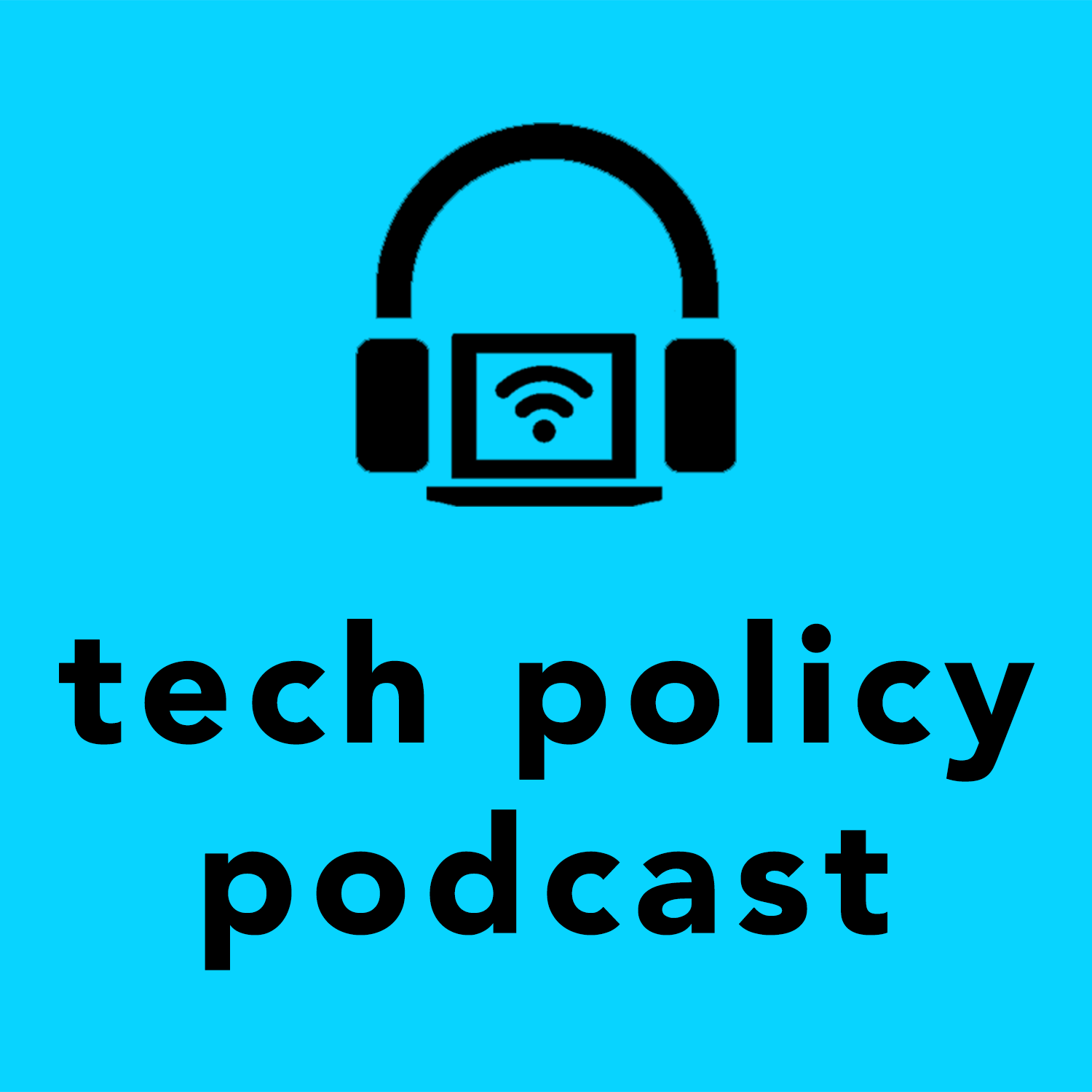Episodes

Wednesday Sep 06, 2017
#194: Is the RAISE Act Sinking?
Wednesday Sep 06, 2017
Wednesday Sep 06, 2017
When it comes to immigration policy, the headlines are naturally focused on DACA, Dreamers, and illegal immigration. But many in Congress are also looking to reduce legal immigration, namely Senators Tom Cotton (R-AR) and David Perdue (R-GA), who introduced the RAISE Act, aimed at cutting green cards issued in half over the next ten years. What kind of impact does legal immigration have on the tech sector, and how might the RAISE Act change that? What else could Congress do to address problems in our immigration system without stifling entrepreneurship and innovation? Evan is joined by Alex Nowrasteh, immigration policy analyst at the Cato Institute, and Graham Owens, legal fellow at TechFreedom. For more, see Alex’s post on the RAISE Act.
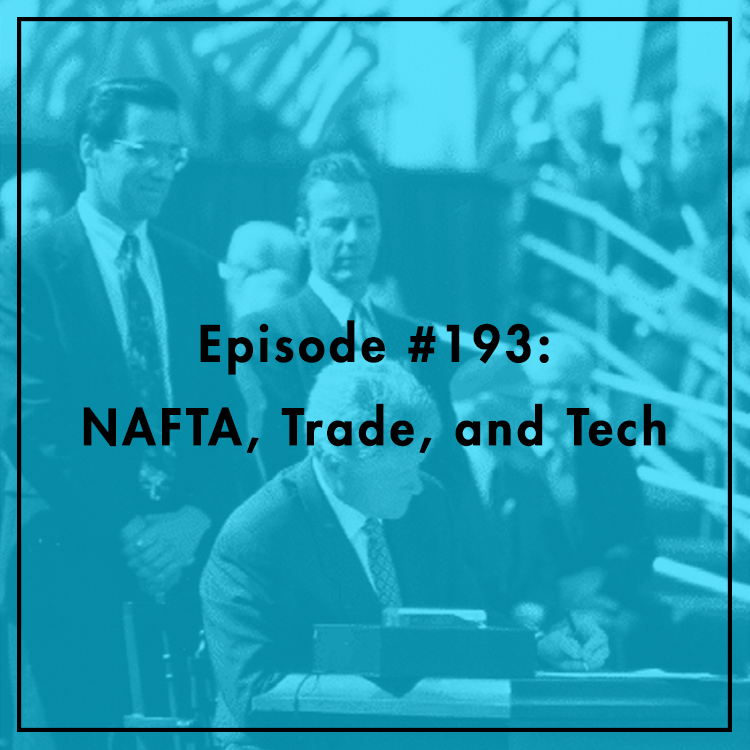
Thursday Aug 31, 2017
#193: NAFTA, Tech, and Trade
Thursday Aug 31, 2017
Thursday Aug 31, 2017
The North American Free Trade Agreement was a major sticking point in the 2016 election, with then-candidate Trump criticizing the trade deal for killing U.S. jobs, particularly in manufacturing. But how do policies like NAFTA impact technology and the everyday consumer experience? Recently, Canada, Mexico, and the United States began renegotiating the 1994 trade agreement, aiming to complete a new deal by the end of the year. Should tech stakeholders be worried about changes to NAFTA, or is this an opportunity for improving a deal that was struck long before most Americans had ever used the Internet? What will it mean for cybersecurity, intellectual property, tariffs, and other tech issues? Evan is joined by Ed Brzytwa, Director of Global Policy for the Information Technology Industry Council (ITI). For more, see ITI’s comments on NAFTA modernization.
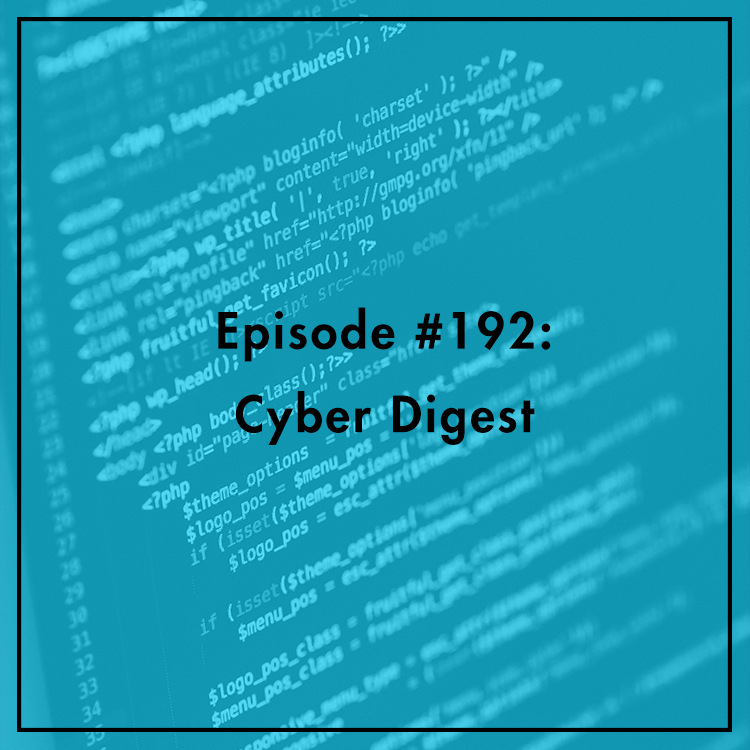
Friday Aug 25, 2017
#192: Cyber Digest
Friday Aug 25, 2017
Friday Aug 25, 2017
It seems like every week there are more headlines about cyber attacks. Should you be worried about the next Petya or WannaCry? What can we do to protect ourselves from getting hacked? With an endless stream of alarming incidents — Sony, HBO, North Korea, and federal agencies — are we at risk of falling into a “cyber fatigue?” Evan is joined by Heather West, Senior Policy Manager for the Americas at Mozilla, and Austin Carson, Executive Director of TechFreedom. They discuss the latest in cyber news and what Internet users, and their governments, can do to sort through the mess. For more, see TechFreedom’s primer on the PATCH Act and Mozilla’s policy blog.

Monday Aug 21, 2017
#191: The Future of Online Music
Monday Aug 21, 2017
Monday Aug 21, 2017
The Internet has changed a lot over the past 20 years, and so has the music industry. CDs and record stores have been replaced by streaming and the iTunes store. While consumers are benefitting from more content and ways to listen to music than ever before, prominent artists like Taylor Swift have lamented declining revenues for artists in the digital age, even taking their gripes to the halls of Congress. Is streaming a viable future for online music, or will online piracy and low royalties spoil the party? Are websites like YouTube doing enough to combat copyright infringement? Evan is joined by Steven Marks, Chief of Digital Business & General Counsel for the Recording Industry Association of America (RIAA). For a different perspective on copyright, listen to episode #176.
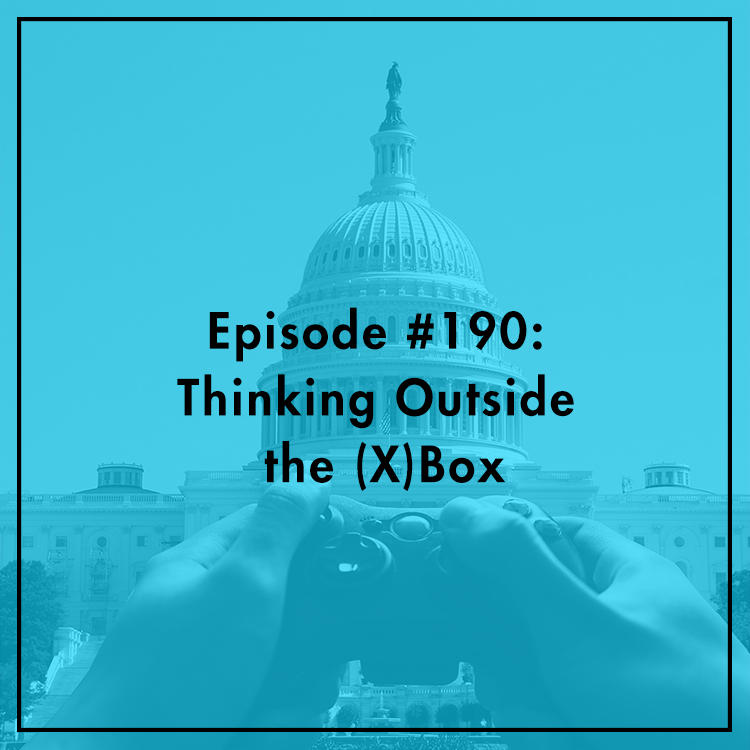
Tuesday Aug 15, 2017
#190: Thinking Outside the (X)Box
Tuesday Aug 15, 2017
Tuesday Aug 15, 2017
What does government have to do with video games? Censorship and the First Amendment may come to mind, but that’s only a small piece of the puzzle. The American video game industry is worth $30 billion, and everything from tax reform to NSA surveillance can have a huge impact on this growing sector of the economy. Why should gamers care about net neutrality and broadband deployment? Are there policy solutions to the dreaded “lag” problem? How do free trade and intellectual property fit in the mix? Evan discusses all this and more with Mike Gallagher, President and CEO of the Entertainment Software Association (ESA), the trade group representing U.S. computer and video game publishers.
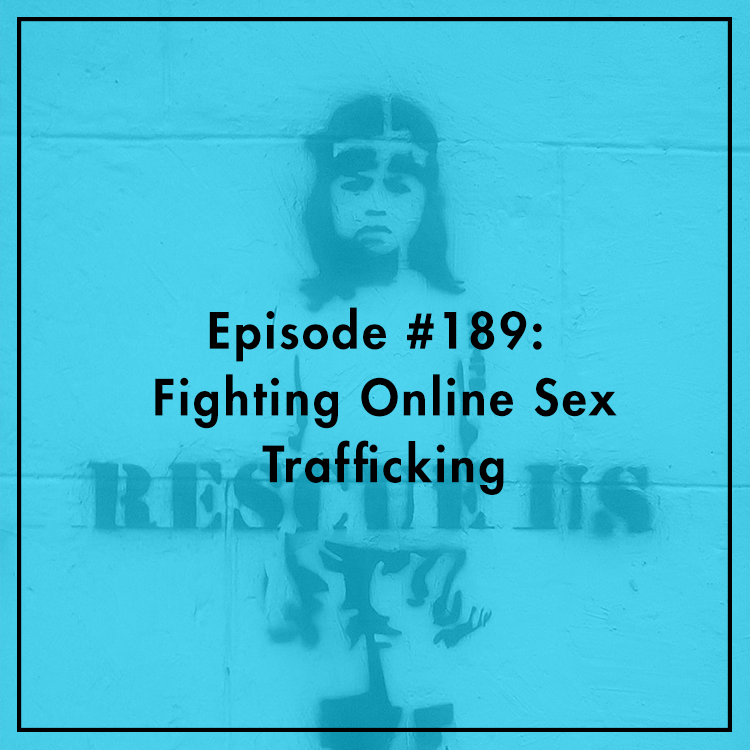
Friday Aug 11, 2017
#189: Fighting Online Sex Trafficking
Friday Aug 11, 2017
Friday Aug 11, 2017
Recently, Senators Rob Portman (R-OH) and Claire McCaskill (D-MO) introduced the Stop Enabling Sex Traffickers Act (SESTA). The bill is gaining co-sponsors and support on both sides of the aisle, and virtually everyone agrees that sex trafficking is a very real problem that Congress needs to address. But the bill is also getting pushback from voices across the spectrum, including right- and left-leaning civil society groups and tech companies big and small.
Supporters of SESTA argue that long-standing intermediary liability protections for web platforms are enabling sex trafficking, citing the website Backpage.com, whose founders knowingly profited from and facilitated sex crimes. Critics of SESTA caution that the safe harbor in Section 230 of the Communications Decency Act is a bedrock of Internet freedom, and warn that the bill would actually undermine cooperation between law enforcement and tech companies. Evan discusses with TechFreedom’s Berin Szoka and Ashkhen Kazaryan. For more, see our coalition letter.

Friday Aug 04, 2017
#188: Sex Offenders and Social Media
Friday Aug 04, 2017
Friday Aug 04, 2017
Sex offenders are often banned from playgrounds and schoolyards, but what about social networks? Should policymakers treat the virtual world the same as the real world? North Carolina passed a law in 2008 banning sex offenders from accessing websites where information is exchanged and minors can participate, including social media platforms like Facebook. Recently, the Supreme Court ruled unanimously that the North Carolina law violates free speech, meaning sex offenders can use Facebook as long as they’re not using it to commit crimes. What does this case mean for digital free speech? How should policymakers proceed from here? Evan is joined by Katie Glenn, Policy Counsel at the 1st Amendment Partnership. For more, check out their website.

Thursday Jul 27, 2017
#187: Engaging Cuba
Thursday Jul 27, 2017
Thursday Jul 27, 2017
Like most things in Cuba, the Internet is complicated. While only a tiny percentage of homes have WiFi, nearly a third of Cubans went online in 2016, and the growing private sector is increasingly digital. While the previous administration opened up relations with Cuba in 2014, President Trump announced a rollback of some of those reforms in a speech in Miami last month. How will the potential changes affect Cuba’s digital future? Evan is joined by Celia Mendoza, founder of Concierge Havana, a travel agency geared toward American visitors to Cuba; Robin Pedraja, founder of Vistar, a magazine focused on culture and entertainment and the first independent media outlet in Cuba; and Michael Maisel, Director of External Affairs at Engage Cuba.
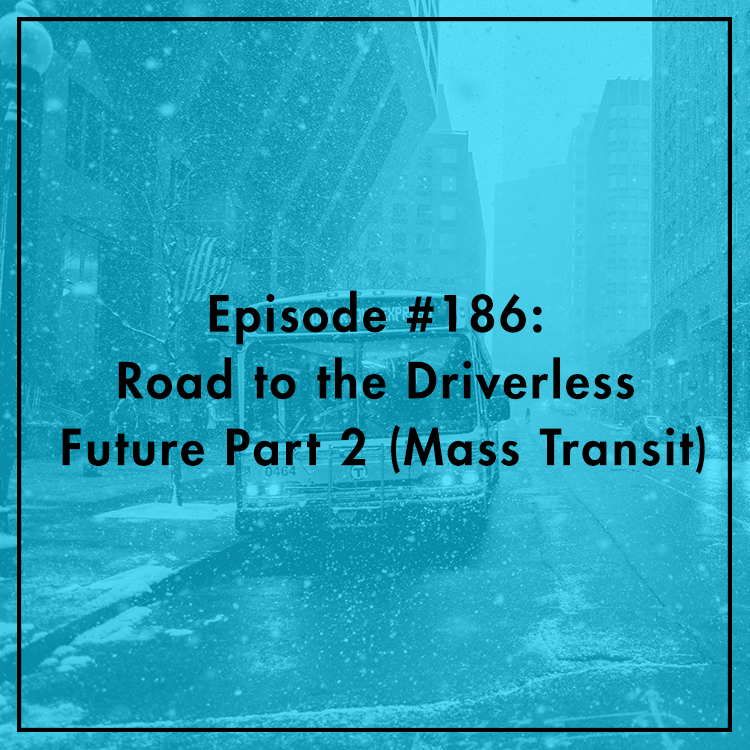
Friday Jul 14, 2017
#186: Road to the Driverless Future Part 2 (Mass Transit)
Friday Jul 14, 2017
Friday Jul 14, 2017
As the autonomous future approaches, what will it mean for public transit? Cities across the world are testing new technologies, such as collision avoidance and emergency braking, in their transit systems. But the changes won’t just be limited to our vehicles, as credit card companies and payment apps get it on the action, too. What can the U.S. learn from Finland’s approach? Will fears over cybersecurity and privacy hold back the automation of public transit? Will workers feel threatened by new tech? How will labor unions respons? Evan is joined by Darnell Grisby, Director of Policy Development and Research at the American Public Transportation Association. For more, check out apta.com/resources.
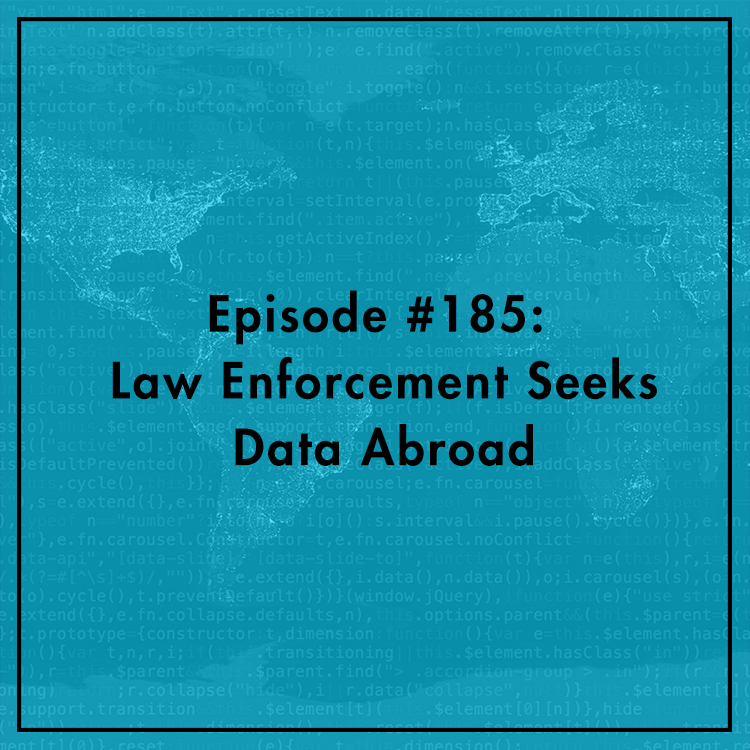
Monday Jul 10, 2017
#185: Law Enforcement Seeks Data Abroad
Monday Jul 10, 2017
Monday Jul 10, 2017
In the Digital Age, your data could be stored anywhere in the world, regardless of where you live. So what happens when your police department is investigating a crime in the United States, but the relevant data are stored in Ireland? Do you need a U.S. warrant, or an Irish one? How much of a problem for law enforcement is cross-border data? What kinds of agreements can nations strike to facilitate investigations without trampling on civil liberties and human rights? Evan is joined by Jennifer Daskal, Associate Professor at American University’s Washington College of Law, and Drew Mitnick, Policy Counsel at Access Now. For more, see Drew’s five-part blog series and Jennifer’s latest post.

